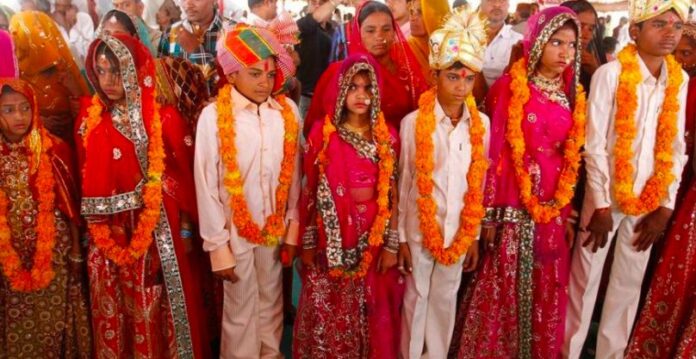-
Children born to adolescent mothers have higher prevalence of stunting due to low nutrition levels and lack of counselling in early pregnancy
-
According to the NSSO report 2017-18 (persons aged 3-35), marriage was the 4th reason to drop out from attaining higher education at 13.2%
-
Most people complete their senior secondary by 18 or 19 years.
The Prohibition of Child Marriage (Amendment) Bill, 2021 was introduced in the Lok Sabha on December 2021 (got referred to the Standing Committee). The bill seeks to increase the minimum age of marriage for females to 21 years amending Prohibition of Child Marriage Act, 2006 and overriding all personal laws, practices and customs. In addition to this, the annulment process for a person married below the minimum age will extend to 23 years (previously 20 years).
The need of this bill cropped up when the Government appointed a task-force in June, 2020 under Ms Jaya Jaitely to examine the correlation of marriage age and motherhood with an aim to lower indicators such as infant mortality rate (IMR), Maternal Mortality Rate (MMR), increase nutrition and opportunities. The task-force submitted its report in December, 2020 and recommended to increase the minimum marriage age of females and to break patriarchal mindsets.
Children born to adolescent mothers have higher prevalence of stunting due to low nutrition levels and lack of counselling in early pregnancy. According to the NSSO report 2017-18 (persons aged 3-35), marriage was the 4threason to drop out from attaining higher education at 13.2%. Most people complete their senior secondary by 18 or 19 years. By the time they reach 21 they are graduating. Increasing the age will make people consider graduation an option before marriage. Furthermore, many people stay in hostels during these years and learn many aspects of life – how to manage funds, resources, time, become responsible for their daily chores and how to live with other people. National Family Health Survey (2005-06)-3 stated that 47% of people belonging to 20-24 years were married before 18 years which reduced to 23% (NFHS-5 -2019-21).
UNICEF (2020), Law Commission of India (2018), UN Convention on the rights of the Child (2016), all have voiced an equal marriage age for both sexes to 18 years. Uniform age equates to ‘Gender Egalitarian’
Law is a force of coercion and it will simply underground these cases. The best way is to focus on overall development and spreading awareness.
However with this step, priorities are misplaced. Instead of women empowerment, sexual and ,reproductive health and honor killing, the focus is on the right age. In most laws (Civil-Contract Act, Criminal-Juvenile Justice), a person who attains majority is responsible for his/her action. Marriage is a life choice and by increasing the minimum age it goes against Article 21 (SC, 2018). In the NSSO study, marriage was only the 4th reason.
Domestic activities, financial constraints and no interest in education were the primary reason for dropouts. The Periodic Labour Force Survey (2019-20) shows the workforce participation of illiterate females and who hold PG degrees were 36.8% and 38% respectively. States such as West Bengal, Bihar and Tripura, the child marriage percentage is 41.6%, 40.8% and 40.1% respectively, way above the national average (23), in-spite that, the IMR, MMR and SRB though poor, fares better than many states (Uttar Pradesh), which further cements that poverty alleviation and improving socio-economic conditions are better ways to improve indicators.
UNICEF (2020), Law Commission of India (2018), UN Convention on the rights of the Child (2016), all have voiced an equal marriage age for both sexes to 18 years. Uniform age equates to ‘Gender Egalitarian’. Law is a force of coercion and it will simply underground these cases. The best way is to focus on overall development and spreading awareness.
*************************************************************
Readers
These are extraordinary times. All of us have to rely on high-impact, trustworthy journalism. And this is especially true of the Indian Diaspora. Members of the Indian community overseas cannot be fed with inaccurate news.
Pravasi Samwad is a venture that has no shareholders. It is the result of an impassioned initiative of a handful of Indian journalists spread around the world. We have taken the small step forward with the pledge to provide news with accuracy, free from political and commercial influence. Our aim is to keep you, our readers, informed about developments at ‘home’ and across the world that affect you.
Please help us to keep our journalism independent and free.
In these difficult times, to run a news website requires finances. While every contribution, big or small, will makes a difference, we request our readers to put us in touch with advertisers worldwide. It will be a great help.
For more information: pravasisamwad00@gmail.com



